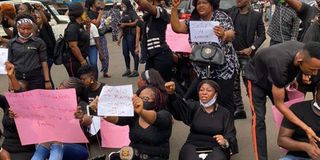Breaking News: At least 10 feared to have drowned in Makueni river
Women want survivor-centred approach in SGBV cases

What you need to know:
- Women’s rights organisations are rooting for a survivor-centred approach in investigating and prosecuting cases of SGBV.
- They propose that the NCRC consider the survivors multiple needs, assess their risks and vulnerabilities, keep them safe and secure, and adhere to the principles of confidentiality, privacy while probing the violations.
- hey also demand that the government allocates adequate resources for State-run safe houses or shelters for witness protection of SGBV survivors/witnesses.
- They are also rooting for the operationalisation of Section 39 (13) of the Sexual Offences Act No. 3 of 2006 that provides for a register for convicted sexual offenders.
Women’s rights organisations are rooting for a survivor-centred approach in investigating and prosecuting cases of Sexual and Gender-Based Violence (SGBV).
They have welcomed the move by President Uhuru Kenyatta directing the National Crime Research Centre (NCRC) to undertake investigations into the rising cases of SGBV and teenage pregnancy in the country.
“The directive by the President comes at a time when cases of SGBV including rape, defilement, child marriage, Female Genital Mutilation (FGM), teenage pregnancies are at an alarming rate.
The impact and injury of SGBV on survivors and their families are often long term and affect the physical and their mental well-being,” the rights groups say in a statement.
They say they are cognizant of the progressive steps put in place to address cases of SGBV as well as the existing legal frameworks and policies, which have offered guidance for prosecution of sexual violence cases.
STATE INTERVENTION
However, the women’s rights advocates note that there is a pressing need to ensure existing laws and guidelines are implemented and enforced fully.
The lobby groups include SDGs Kenya Forum, Physicians for Human Rights, Equality Now, Centre for Rights Education and Awareness (Creaw), Collaborative Centre for Gender and Development and Women’s Link Worldwide.
They say survivor reserve the right to be heard, believed, supported and must be at the centre of all SGBV redress interventions by the State.
The rights groups propose that the NCRC consider the survivors multiple needs, assess their risks and vulnerabilities, keep them safe and secure, and adhere to the principles of confidentiality and privacy while probing these violations.
To achieve survivor-centre approach, they proposes that the Judiciary fast-track the establishment of the SGBV crimes courts to ensure sexual violence cases are heard and determined in a timely manner.
SAFE HOUSES
They also demand that the government allocates adequate resources for State-run safe houses or shelters for witness protection of SGBV survivors/witnesses.
The activists want NCRC to ensure SGBV survivors are at the centre of all investigations undertaken and that the survivors’ rights are upheld at all times.
Access to justice for the victims and survivors of sexual violence has been a tall order after the scaling down of Judiciary operations, leading to closure of some courts, postponement of hearings and backlog of cases in the wake of the Covid-19 pandemic.
In this regard, the rights groups observe that Article 48 of the Constitution places an obligation on the State to ensure cost-friendly access to justice for all persons. They propose that justice services including counselling and legal assistance to SGBV survivors be part of the essential services during the pandemic.
They are also rooting for the operationalisation of Section 39 (13) of the Sexual Offences Act No. 3 of 2006 that provides for a register for convicted sexual offenders.
They want NCRC to partner with women’s rights organisations through regular consultations and providing reports of the progress made.
CORONAVIRUS DISEASE
They add that in times of emergencies, pandemics or crises, existing inequalities in society are exacerbated and as experienced in the country, the rights of women and girls have been grossly violated.
“Women and girls have been disproportionately affected and remain isolated from resources and their support systems due to the disruption of the referral pathways,” the groups say.
Whereas it is critical to focus on averting further spread of coronavirus disease, the groups opine that it is integral that measures are put in place to counter any second-order impacts of public health restrictions including increased rates of SGBV, and that policies shift to prioritize its prevention going forward.
They have called for a multi-sectoral response to the increased SGBV menace to ensure perpetrators are held accountable, justice delivered to survivors and the rights and dignity of women and girls are safeguarded.
They observe that even prior to the Covid-19 pandemic, violence against women and girls was of critical concern with countless women lacking access to essential services for their safety, protection and recovery such as police and justice sector response, safe shelters and psychosocial support.





